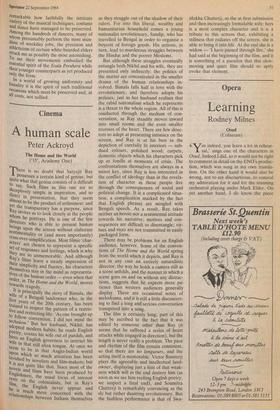Cinema
A human scale
Peter Ackroyd
The Home and the World (`15', Academy One) There is no doubt that Satyajit Ray possesses a certain kind of genius; but quite what that genius consists of is difficult to say. Such films as this one are so deceptively simple in inspiration, and so direct in presentation, that they seem almost to be the product of artlessness: and yet the transparency has a purpose, since Ray invites us to look closely at the people Whom he portrays. He is one of the few directors who is able to present human beings upon the screen without elaborate sentimentality or (and more importantly) crass over-simplification. Most filmic 'char- acters' are chosen to represent a specific set of responses and feelings, which is why they are so unmemorable. And although Ray's films leave a steady impression of their simplicity and fluency, his characters themselves stay in the mind as representa- tives of the human order — even when that order, in The Home and the World, moves towards tragedy.
It is principally the story of Bimala, the wife of a Bengali landowner who, in the first years of the 20th century, has been trained to respect the pattern of a restric- tive and restricting life: 'As one brought up to follow convention, I did not mind the seclusion.' But her husband, Nikhil, has adopted modern habits: he reads English poetry, coaxes his wife out of purdah, and hires an English governess to instruct his i wife in that still alien tongue. At once we seem to be in that Anglo-Indian world upon which so much attention has been lavished by novelists and film-makers; but i
it is not quite like that. Since most of the novels and films have been produced by Englishmen, the usual focus of interest rests on the colonialists; but in Ray's film, the English never appear and he is much more concerned with the relationships between Indians themselves
as they struggle out of the shadow of their rulers. For into this liberal, wealthy and humanitarian household comes a young -nationalist revolutionary, Sandip, who has travelled to Bengal in order to organise a boycott of foreign goods. His actions, in turn, lead to murderous struggles between the Hindus and the poorer Moslems.
But although these struggles eventually entangle both Nikhil and his wife, they are presented only indirectly: the politics of the matter are concentrated in the smaller drama of the human relationships in- volved. Bimala falls half in love with the revolutionary, and therefore adopts his policies, just as her husband realises that the rabid nationalism which he represents is a threat to the whole region. All of this is conducted through the medium of con- versation, as Ray steadily moves inward into small rooms and the even smaller recesses of the heart. There are few direc- tors so adept at presenting intimacy on the screen, and Ray is at his best in the depiction of carefully lit interiors — sub- dued colours, polished wood, carpets, domestic objects which his characters pick up or fondle at moments of crisis. The confrontations themselves are always in a minor key, since Ray is less interested in the conflict of ideology than in the revela- tion of character as these people live through the consequences of social and political change. It is a complicated situa- tion, a complication marked by the fact that English phrases are mingled with Bengali speech. As a result, Ray takes neither an heroic nor a sentimental attitude towards his narrative; motives and con- sequences are difficult to disentangle; vir- tues and vices are not transmitted in easily packaged form.
There may be problems for an English audience, however. Some of the conven- tions of The Home and the World spring from the world which it depicts, and Ray is not in any case an entirely naturalistic director: the way he holds a camera still as a scene unfolds, and the manner in which a scene goes on and on without any distrac- tions, suggests that he expects more pa- tience than western audiences generally display. There are occasional notes of melodrama, and it is still a little disconcert- ing to find a long and serious conversation transposed into a song.
The film is certainly long; part of, this may be ascribed to the fact that it was edited by someone other than Ray (it seems that he suffered a series of heart attacks while engaged in direction), but the length is never really a problem. The pace and rhythm of the film remain consistent, so that there are no longueurs, and the acting itself is memorable. Victor Bannerji plays the agreeable and intellectual land- owner, displaying just a hint of that weak- ness which will in the end destroy him (as soon as we see him reciting English poetry, we suspect a fatal end), and Soumitra Chatterji is remarkably convincing as the sly but rather daunting revolutionary. But the faultless performance is that of Swa- tilekha Chatterji, as the at first submissive and then increasingly formidable wife.: hers is a most complex character and it. is a tribute to this actress that, exhibiting a stillness that radiates off the screen, she is able to bring it into life. At the end she is a widow — 'I have passed through fire,' she had said at the beginning of the film, and it is something of a paradox that this slow- moving and quiet film should so aptly evoke that element.










































 Previous page
Previous page